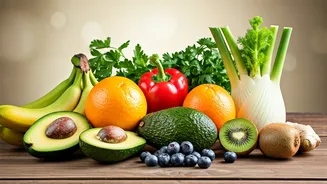Cucumber: Refreshing Relief
Cucumber, a cool and hydrating vegetable, holds a wealth of benefits beyond simple refreshment. Its high water content plays a crucial role in preventing
constipation, which often contributes to bloating. Additionally, cucumbers contain enzymes that aid in digestion, making them an excellent choice for a smoother digestive process. The enzymes within the cucumber help break down food, decreasing the likelihood of gas buildup. Furthermore, the mild nature of cucumber makes it easily digestible, ensuring it doesn't add to digestive discomfort. Adding cucumber to your daily meals, perhaps as a salad component or a simple snack, can be a refreshing and effective step toward reducing bloating and promoting a balanced gut.
Fennel: Digestion's Ally
Fennel, a vegetable with a distinctive anise-like flavour, is a potent ally against bloating. It contains compounds that relax the muscles of the digestive tract, thereby easing gas and reducing cramping. Fennel seeds, often consumed as a digestive aid, have been a traditional remedy for bloating. They help stimulate the release of digestive juices, which aids in breaking down food more efficiently. This efficient breakdown lessens the chance of gas accumulation. Fennel can be consumed in various forms, including the bulb itself in salads, roasted dishes, or as a tea brewed from the seeds. Its versatility makes it a simple addition to improve your digestive wellness and ease discomfort related to gas and bloating.
Pineapple: Enzyme Powerhouse
Pineapple is known for its sweet taste and also for the enzyme bromelain. Bromelain is a powerful enzyme that helps break down proteins and can minimize inflammation in the digestive tract. By assisting the body in digesting food properly, bromelain reduces the chance of gas and bloating. This enzyme-rich fruit is beneficial, especially after a heavy meal that might challenge your digestive system. Enjoying pineapple chunks, adding them to smoothies, or consuming pineapple juice can bring a delightful and beneficial addition to your diet. The natural properties of pineapple offer a tasty route to support your digestive health and minimize the effects of bloating.
Bananas: Gentle Aid
Bananas are known for their high potassium content, which can help regulate sodium levels, which can lead to bloating. Potassium helps balance fluids in the body, which can minimize water retention. Additionally, bananas contain soluble fibre that supports smooth bowel movements, mitigating constipation, a frequent cause of bloating. The natural sugars in bananas are easily digestible, making them a gentler choice for your digestive system. Whether you incorporate them in your morning cereal, use them in smoothies, or simply consume them as a snack, bananas are a simple and effective method to help manage bloating, improving your overall digestive function.
Lemon: Digestive Booster
Lemon, with its acidic nature, can stimulate the production of stomach acid, which is crucial for efficient digestion. Adequate stomach acid supports breaking down food and reduces the likelihood of undigested food leading to gas and bloating. Lemon also works as a diuretic, assisting in reducing water retention, further relieving bloating. Adding lemon juice to water or incorporating it into your cooking is an easy way to promote healthy digestion and combat bloating. The high vitamin C content in lemon provides antioxidants that further benefit your overall health, offering you both digestive and overall health benefits.
Papaya: Digestive Enzyme Power
Papaya houses an enzyme called papain, which has strong protein-digesting properties, similar to bromelain found in pineapple. Papain helps break down protein molecules, lessening the load on the digestive system and preventing gas and bloating. Consuming papaya can ease the discomfort from overeating or meals with high protein content. It also possesses anti-inflammatory qualities that can soothe the digestive tract. Whether eaten raw, blended in smoothies, or enjoyed as a snack, papaya's gentle nature makes it a palatable way to enhance digestion and reduce bloating.
Oats: Fibre's Friend
Oats are a great source of soluble fibre. This fibre absorbs water in the gut, thereby aiding the movement of food through your digestive system, preventing constipation and bloating. The slow release of energy from oats also helps regulate blood sugar levels, indirectly influencing digestive wellness. Eating oats for breakfast or including them in your diet can regulate your bowel movements, which is key for reducing bloating. Moreover, the fibre in oats feeds the healthy gut bacteria, boosting gut health. These aspects make oats a powerful addition to your diet for improved digestion and a reduced feeling of fullness.
Mint: Soothing Effect
Mint, with its refreshing properties, has a relaxing effect on the muscles of the digestive tract, aiding in gas release and alleviating bloating. Mint can ease digestive spasms and improve the flow of bile, contributing to smoother digestion. Peppermint, particularly, has been shown to reduce symptoms of irritable bowel syndrome (IBS), including bloating. Enjoying mint tea or adding mint to your meals is a simple way to experience its digestive benefits. The cooling properties of mint also offer a sense of comfort, which is helpful in easing bloating symptoms, making it a delicious and useful addition to your daily habits.
Yogurt: Probiotic Power
Yogurt, especially those with live cultures, is an excellent source of probiotics, the beneficial bacteria that inhabit your gut. These bacteria help balance the gut flora, which can improve digestion and reduce bloating. Probiotics help in breaking down food and reducing gas production. Yogurt also contains calcium and protein, supporting overall digestive and gut health. Choosing yogurt regularly can improve your digestive health and minimize bloating, resulting in a more balanced and comfortable gut environment. Its various consumption styles make it a simple and tasty way to improve digestive comfort.















